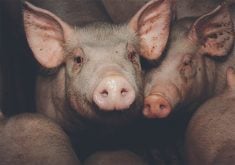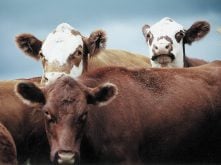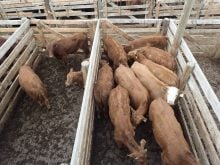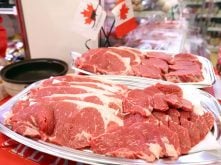STRONG JULY PRICES
Fat cattle closed at more than $100 per hundredweight last week, the first time such prices have held in July. Last year at this time fed cattle were trading in the $85 per cwt. range.
However, show list volumes were smaller and consisted mostly of live sales for cash.
The cash to futures basis widened and closed at -$8.25. October futures closed at $104.69 per cwt. and December closed at $108.56.
Overall packer interest was also moderate, but U.S. buyers were looking for cattle following the July 4 holiday. As a result, 9,420 Canadian fat cattle made their way south.
Read Also

More factors affecting winter weather
When you combine a weak La Niña, early Siberian snow, and a warm northern Pacific, it’s easy to see why long-range winter forecasting is so complex.
The fat exports exceeded the other classes of cattle, but the number going south still remains much below average. Exports of fed cattle are down 38 percent from last year at this time while feeders are down 62 percent.
Domestically, Alberta steers traded at a premium to Ontario in the latter part of 2010 and into the first quarter of the year, but tighter supplies in the east saw prices rebound as consumer demand grew in the spring months.
Ontario prices are only two percent below their April peak, while Alberta prices are nine percent below that spring upsurge of $109.70 per cwt.
Ontario 750 pound feeder steers have maintained a small premium over Alberta. Whether the premium can hold depends on whether fat cattle continue to trade at a premium and the West continues to have a cost of gain advantage with barley cheaper than corn.
GOOD FEEDER DEMAND
Auction market volumes on large lots of Alberta feeder cattle were reported. Volumes were 40 percent higher than the previous week.
Those in the 500-600 lb. class averaged $151.40 per cwt. Steers weighing 600-700 lb. were $139.60 while bids for the 700-800 lb. class averaged $128.13 per cwt. In Ontario, calves weighing 500-600 lb. were $144.61, 600-700 lb. were $127.33 and 700-800 lb. averaged $129.29.
Owners are looking to fill their pens as conditions improve in wet western feedlots, so it is expected large lots of feeder calves should see good demand and procure a premium.
SLAUGHTER COWS DOWN
Slaughtercow offerings were moderate with trade below last week by 28 percent. In the West, D1,2 cows were $65-$70 per cwt. and D3 cows were $57-$72 per cwt.
Butcher bulls were down $1.40 per cwt. averaging $86.32 per cwt.
Non-fed offerings of cows and bulls should wind down soon and supplies tighten. Prices are anticipated to rebound over the next few weeks as summer burger demand eats up what is in storage.
CUTOUTS STEADY
Canadian AAA and AA cutouts for the week ending July 1 saw modest gains of 75 cents per cwt. and all trim remained steady. AAA cutout was $169.22 per cwt. and AA cutout was $166.45. Montreal wholesale market for next week’s delivery traded steady and was $193-$195 per cwt.
Quality grades showed less AAA is available. About 42 percent of carcasses made AAA, while 52 percent were AA. Less than one percent made Canada Prime.
U.S. cut-out values traded $1.25 per cwt. higher last week on generally light to moderate demand and offerings. Beef trim traded mostly steady.
Live prices in the United States were generally higher by $3-$5 US per cwt. across all categories, but consumers may resist the resulting higher beef prices as the American economy continues to falter.
This cattle market information is selected from the weekly report from Canfax, a division of the Canadian Cattlemen’s Association. More market information, analysis and statistics are available by becoming a Canfax subscriber by calling 403- 275-5110 or at www.canfax.ca.
———
access=subscriber section=markets, livestock, none














